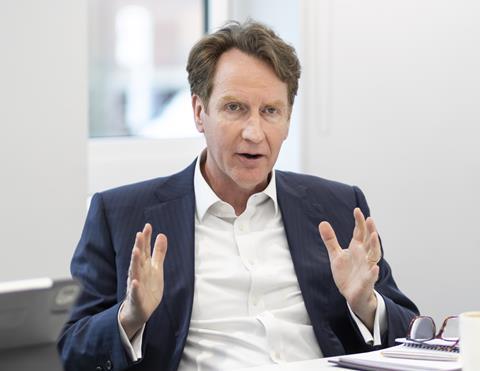Wates boss Eoghan O’Lionaird has said the industry has been too quiet in embracing and responding to the findings in this month’s Grenfell Inquiry report.
The report said the industry needed major reform and recommended an industry regulator be established with the government set to respond formally within the next six months.
But O’Lionaird told Building’s Building the Future Conference this afteroon that not enough firms had been prepared to publicly accept the significance of retired judge Sir Martin Moore-Bick’s report.
He said: “Since the publishing of the final Grenfell inquiry report, there has been a relative silence from industry participants – it’s as if we have collectively been keeping our heads down.

Eoghan O’Lionaird said the industry needs to get on baord with the Grenfell findings - and work out how to make more money
“I would suggest we need to collectively – and individually – raise our heads above the parapet and to commit openly that this has to be a watershed moment – that we will not allow the cutting of corners, the pressure to deliver profits, the cosiness of mutually beneficial relationships to override the need to do what is right.”
He added: “Now, please don’t get me wrong: I’m not preaching that we at Wates have got this right all the time, nor am I casting aspersions at others. We all have opportunities to improve, and reasons to improve – and now is the time to do so.
“And while I fear that many of the attitudes preceding Grenfell still sadly exist in certain quarters of the industry, it is our responsibility to change that.
“While not perfect, the Building Safety Act points the dial in the right direction to focus minds on the hard truths we must accept to change for the better. But ultimately this is just the start of a long journey, not the end.”
>> See also: ‘We will deliver a generational shift’… Why the Grenfell Inquiry report means another building safety shake-up
>> See also: Hang on, what about the margins?
>> See also: ‘On some levels, it’s a straightforward industry but it has significant challenges’ – Wates’ new(ish) CEO on what he’s learnt so far
O’Lionaird, whose CV includes spells at mining, electronics and marine firms, also said industry margins were too thin and added that his own firm’s margin – “just 2%” – was not good enough.
“I don’t see this as sustainable – in any sense – and indeed we should be honest: the razor-sharp margins in our industry have often led the less scrupulous to cut corners on quality, on sustainability and on safety.”
And he added: “The truth is that the razor-thin margins on which contractors depend are not conducive to making investments in innovation, talent, sustainability, safety or quality – and indeed they are not conducive to survival.
“This uncomfortable truth has for too long been ignored – and the consequences of ignoring it are very grave indeed.
“Given my experience outside construction, and knowing now the profound value added by contractors, it baffles me how and why we accept these razor thin the margins
“The risk versus reward equation is totally out of kilter and its frankly bizarre that it is the contractors who take on the most risk but pick up the smallest remuneration packet at the end.”
Earlier this month, announcing an £18m profit on turnover of £4.3bn, Laing O’Rourke chief executive Cathal O’Rourke said average industry margins of between 2.5% and 3% were “not sustainable” and added: “This acts as a significant handbrake on the sector’s ability to invest in the transformative technologies that will create step-change.”
O’Lionaird said: “At Wates we are determined to change the calculus that has for so long dogged us – and all our principal contractor peers. Individually and collectively, we must work with our customers to make clear the value we create; collaborate and innovate with our supply chain partners to find better ways to improve our shared productivity; and double down on our own operations to deliver safety, sustainability, and quality by design, first time, every time.”
Last year, Wates saw turnover up 15% to £2.2bn and posted a pre-tax profit up a third to £46m.

